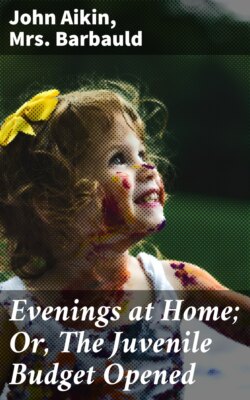Читать книгу Evenings at Home; Or, The Juvenile Budget Opened - John Aikin - Страница 24
На сайте Литреса книга снята с продажи.
THE HOG AND OTHER ANIMALS.
ОглавлениеTable of Contents
A debate once arose among the animals in a farmyard, which of them was most valued by their common master. After the horse, the ox, the cow, the sheep, and the dog, had stated their several pretensions, the hog took up the discourse.
“It is plain,” said he, “that the greatest value must be set upon that animal which is kept most for his own sake, without expecting from him any return of use and service. Now, which of you can boast so much in that respect as I can?
“As for you, horse, though you are very well fed and lodged, and have servants to attend upon you, and make you sleek and clean, yet all this is for the sake of your labour. Do not I see you taken out early every morning, put in chains, or fastened to the shafts of a heavy cart, and not brought back till noon; when, after a short respite, you are taken to work again till late in the evening? I may say just the same to the ox, except that he works for poorer fare.
“For you, Mrs. Cow, who are so dainty over your chopped straw and grains, you are thought worth keeping only for your milk, which is drained from you twice a day to the last drop, while your poor young ones are taken from you, and sent I know not whither.
“You, poor innocent sheep, who are turned out to shift for yourselves upon the bare hills, or penned upon the fallows with now and then a withered turnip or some musty hay, you pay dearly enough for your keep by resigning your warm coat every year, for want of which you are liable to be frozen to death on some of the cold nights before summer.
“As for the dog, who prides himself so much on being admitted to our master’s table, and made his companion, that he will scarce condescend to reckon himself one of us, he is obliged to do all the offices of a domestic servant by day, and to keep watch during the night, while we are quietly asleep.
“In short, you are all of you creatures maintained for use—poor subservient things, made to be enslaved or pillaged. I, on the contrary, have a warm stye and plenty of provisions all at free cost. I have nothing to do but grow fat and follow my amusement; and my master is best pleased when he sees me lying at ease in the sun, or filling my belly.”
Thus argued the hog, and put the rest to silence by so much logic and rhetoric. This was not long before winter set in. It proved a very scarce season for fodder of all kinds; so that the farmer began to consider how he was to maintain all his live stock till spring. “It will be impossible for me,” thought he, “to keep them all; I must therefore part with those I can best spare. As for my horses and working oxen, I shall have business enough to employ them; they must be kept, cost what it will. My cows will not give me much milk in the winter, but they will calve in the spring, and be ready for the new grass. I must not lose the profit of my dairy. The sheep, poor things, will take care of themselves as long as there is a bite upon the hills; and if deep snow comes, we must do with them as well as we can by the help of a few turnips and some hay, for I must have their wool at shearing-time to make out my rent with. But my hogs will eat me out of house and home, without doing me any good. They must go to pot, that’s certain; and the sooner I get rid of the fat ones, the better.”
So saying, he singled out the orator as one of the prime among them, and sent him to the butcher the very next day.
EVENING IV.
